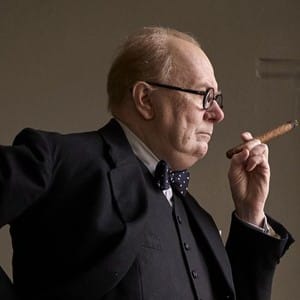Brightest light in the Darkest Hour
🔗 [SYSTEM UPDATE] Link found. Timestamp incremented on 2025-11-26 13:55:13.Gary Oldman is masterly as Winston Churchill in a biopic focusing on a key decision in WWII, DAMIEN NGUYEN writes.


Darkest Hour
Director: Joe Wright
Stars: Gary Oldman, Kristin Scott Thomas, Lily James and Ben Mendelsohn
Melbourne release: January 11
Rating: ★★★½
REVIEW
by DAMIEN NGUYEN
Darkest Hour is a film that revolves around a performance. Gary Oldman disappears into his role as Winston Churchill and is entirely convincing, bringing humour, humanity, and a cantankerous charm to the British legend.

The plot revolves around Churchill’s accession to the prime ministry and his struggles to consolidate his ideals in a divided government. The film narrows its focus to his struggle to decide whether he should seek peace with Nazi Germany, following the events of Dunkirk in 1940.
While the historical outcome is clear, (one only need to listen to or read Churchill’s famous “We shall never surrender”), Wright does an admirable job in heightening the drama behind his decision and to personalise the inner conflict Churchill felt.
Churchill was beset by those who opposed his ideas, from the King to those in the War Cabinet. It is his struggle to keep his ideals and stance strong that creates compelling drama, despite the obvious ending.
Aside from Oldman’s excellent performance (nominated for a Golden Globe for best actor and seen as a likely Oscar nominee), Kristin Scott Thomas performs reliably as Oldman’s stabilising and supportive wife, and Lily James is sweet and a representation of Britain’s common people.
As the King, Ben Mendelsohn is an amusingly awkward and straight counterpart to Oldman’s grumpy and stubborn personality.
To support Oldman’s performance, Wright frames Churchill in many interesting compositional shots. In particular, an intriguing shot of an elevator truly elevates the cinematography of the film, with Churchill rising in darkness, lit only by the warm glow of the carriage. Use of lighting is excellent and creative, with colour-grading and editing to ensure that the film looks period accurate.

However, of note is the slightly poor use of CGI, as some scenes with planes and overhead shots do not fully convince, but the scenes are brief and as such do not detract from the overall film.
With regards to other technicalities, the score is minimal and subtle, played only during key plot points. Sound design of the film revolves around the cadence of Oldman’s delivery and the props used, in particular the sharp crackle of Churchill lighting a match for his pipe.
The subtle intricacies of the film elevate Oldman’s performance, working in unison to enhance, not detract, from the acting display. Wright (Anna Karenina, Pride & Prejudice, Atonement) proves his ability once again to create compelling accurate period-drama films.
Darkest Hour is an engaging film, and a masterclass in acting by Gary Oldman.





